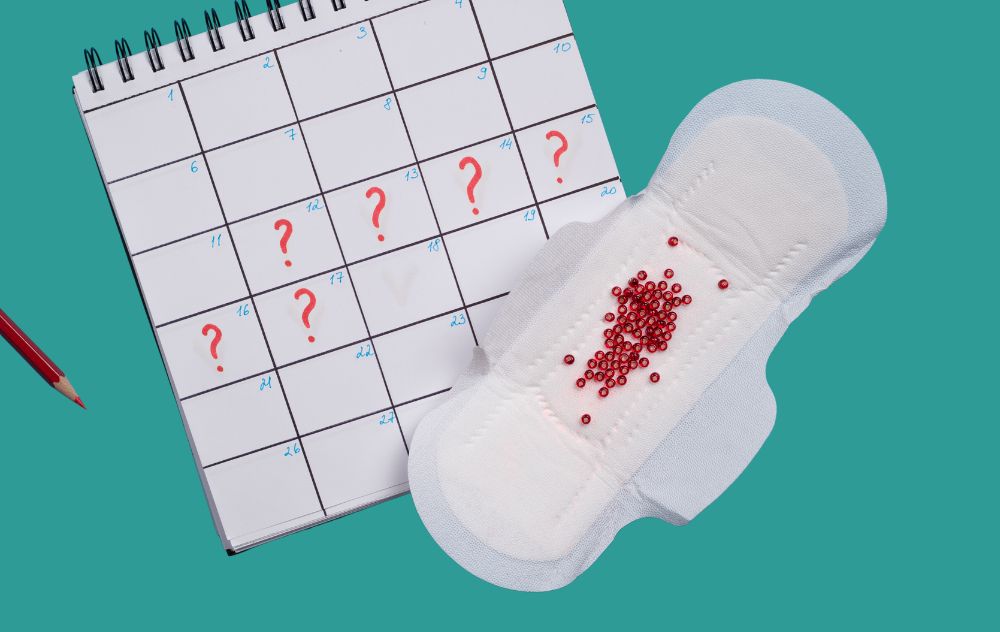
Spotting after your period can feel unsettling, especially when it seems out of the ordinary. Whether it’s a light pink stain or unexpected brown discharge, this kind of bleeding can have a range of causes from hormonal shifts and changes in birth control to stress or underlying conditions like uterine fibroids. In fact, studies show that up to 20 percent of women experience post-period spotting. We’ll walk you through the most common causes of spotting after your period and what they could be telling you about your reproductive health.
Is Spotting After Your Period Normal?
Each month, the body prepares itself for pregnancy, which involves thickening the uterus lining and releasing an egg from the ovaries. If there is no pregnancy, the levels of estrogen and progesterone drop, causing the body to begin menstruating. Monthly, the uterus sheds its lining, expelled from the body along with some blood. Most women may not experience spotting after each period, while others may experience occasional or frequent spotting.
When women ovulate, they may bleed slightly or spot after their period. This bleeding may be due to a temporary decline in estrogen levels between 10 and 14 days before their period. One reason for spotting after a menstrual cycle, especially if a period has already occurred, is because the uterus didn’t flush its inner lining entirely.
While occasional spotting of blood between menstrual cycles is normal, if your menstrual cycle changes suddenly, it may indicate a more serious condition, such as fibroids. Fibroids are non-cancerous growths that cause various symptoms.
If you are experiencing spotting after your period, and you aren’t sure if you have fibroids, our symptom checker can help you figure out if you should consult a fibroid specialist for a diagnosis.

What Causes Spotting After My Period?
Spotting after your period can happen for various reasons. Here’s a breakdown of some potential causes for bleeding after your period ends:
See a doctor if spotting is frequent, heavy, or concerning:
- Hormonal imbalances: These can be caused by stress, weight changes, or certain medical conditions.
- A change in medication: Some medications, like blood thinners, can affect bleeding patterns.
See a doctor for diagnosis and treatment:
- Sexually transmitted infections (STIs): While not always the case, some STIs can cause spotting or irregular bleeding.
- Uterine fibroids: These benign uterine growths can sometimes cause spotting or heavy bleeding.
- Polyps: These are benign growths on the cervix or uterine lining that can cause spotting.
- Endometriosis: Tissue similar to the uterine lining grows outside the uterus and can cause spotting or pain.
- Inflammation of the cervix (cervicitis): Caused by infection or irritation this can lead to spotting.
- Abnormalities in the cervix or uterus: A range of conditions can be benign or precancerous can cause spotting and require a doctor’s evaluation.
Serious conditions requiring immediate medical attention:
- Ectopic pregnancy: This occurs when a fertilized egg implants outside the uterus and is a medical emergency. Symptoms include spotting, sharp pain, and dizziness.
- Start of a miscarriage: Spotting can be an early sign of miscarriage, especially with cramping or pelvic pain.
- Cancer: While less common, cervical or uterine cancer can cause spotting or irregular bleeding.
If you have spotting or bleeding after your period ends, you may want to consult a fibroid specialist to get an accurate diagnosis, as post-period spotting can have many causes. A doctor can determine if fibroids are the culprit through examinations and imaging tests to help rule out other potential causes and ensure you get the most appropriate treatment. Fibroids also vary in size and location, and a doctor can assess the severity and impact on your bleeding patterns. This assessment is crucial for deciding if treatment is necessary and the best approach.
The doctors at USA Fibroid Centers can perform a proper evaluation and diagnosis to determine whether fibroids may be the cause of your unusual spotting.
SCHEDULE YOUR CONSULTATION TODAY
Hormonal Imbalances
One of the possible causes for spotting after a period is hormonal imbalances. Due to the disruption of the hormones responsible for regulating the menstrual cycle, you can experience spotting after your regular monthly cycle ends. Here’s how various hormonal imbalances and conditions can contribute to post-period spotting:
- Ovulation Bleeding: Some women experience spotting around ovulation. Ovulation bleeding may be related to hormonal fluctuations. Higher levels of hormones during ovulation could trigger spotting in some women.
- Hormonal Contraception: A common side effect of hormonal oral contraception is spotting, especially within the first few months of starting it. Combined contraceptives containing estrogen and progestin can sometimes cause spotting as the body adjusts to the new hormone levels. When spotting persists beyond the initial adjustment period, it may indicate the current pill formulation isn’t the best fit. In that case, consult a doctor about switching to a different brand or formulation may be necessary.
- Inconsistent Pill Use: Forgetting or being inconsistent with taking contraceptive pills at the same time each day can also disrupt hormone levels. Additionally, missing doses of the contraceptive pill can result in withdrawal bleeding, which occurs when there is a sudden withdrawal of hormones from the pill, triggering a period-like bleed.
- Polycystic Ovary Syndrome (PCOS): PCOS is a disorder where one of the symptoms is irregular periods. Women with this hormonal disorder typically have higher levels of androgens (male hormones), which can sometimes cause spotting due to hormonal imbalances.
Since there are many reasons for hormonal imbalances to cause spotting after your period, consult your doctor for a diagnosis and to manage any underlying hormonal issues.
Infections and Inflammation
Infections and inflammation can also contribute to post-period spotting. Sexually transmitted infections (STIs), like chlamydia or gonorrhea, can impact the cervix, causing postmenstrual spotting.
Additionally, untreated pelvic inflammatory disease (PID), often from untreated pelvic infections, can cause inflammation of the reproductive organs. Untreated pelvic infections can trigger spotting alongside symptoms like lower abdominal pain, abnormal vaginal discharge, and fever.
Urinary tract infections (UTIs) can also lead to bleeding from the urethra, potentially causing spotting.
Inflammatory processes within the reproductive organs, such as developing uterine fibroids, can disrupt regular menstrual patterns, leading to irregular bleeding. Inflammation weakens tissue integrity and blood vessels, making them more susceptible to bleeding even after menstruation. Chronic inflammation associated with conditions like PID can perpetuate spotting outside the menstrual cycle, further disrupting hormonal signaling and tissue function.
Fibroids and Other Uterine Conditions
Spotting after a period can also be attributed to fibroids and other uterine conditions. Uterine fibroids are non-cancerous growths in the uterus with the potential to disrupt the typical structure of the uterine lining and affect its shedding during menstruation. This disruption often leads to irregular bleeding patterns, including spotting after the period has ended. Fibroids may also cause heavier or prolonged periods due to alterations in blood supply and hormonal imbalances. The pressure they exert on the uterine lining can increase bleeding and prevent the uterus from effectively stopping it. Additionally, fibroids can stimulate the growth of blood vessels, exacerbating irregular bleeding and spotting between periods. Fibroid treatment, such as uterine fibroid embolization, is considered the best method of taking care of fibroids so your menstruation cycle can return to normal.
Similarly, other uterine conditions, like endometrial polyps, can also result in spotting. These small, abnormal tissue growths develop within the uterus, leading to bleeding between menstrual cycles. An ultrasound can help determine if polyps or fibroids are causing the spotting.
Untreated fibroids can disrupt the regularity of periods, leading to increased bleeding, prolonged menstruation, and spotting between cycles. They may also cause discomfort and pain, impacting overall quality of life.
Spotting and Pregnancy
Spotting after a period does not necessarily indicate pregnancy, as there are various reasons for this occurrence. While implantation bleeding sometimes resembles spotting and is a possible sign of early pregnancy, there are other potential reasons.

If you’re concerned about the possibility of pregnancy, take a pregnancy test and consult with a healthcare professional for accurate guidance. Remember that individual experiences can vary, so take your health into your own hands and get the answers you need.
Can Blood Differ in Color During Spotting?
Normal spotting after your period can vary in color, typically from light pink to gray or brown. This variation occurs because spotting often comprises older blood that may have taken longer to exit the body.
The amount of spotting can also provide insight into its source. Heavy spotting is more likely to originate from your uterus, while lighter spotting may come from your cervix or vagina.
For example, brown discharge from the vagina can occur before or after a period. This may happen when blood is noticed in the discharge as the period starts or after it ends. Some women may retain blood in their uterus after their period, leading to contractions that remove the old blood. These contractions can cause cramping and result in brown or black spotting as the old blood is expelled.
However, if you notice bright red blood, particularly if it’s heavy or persistent, or if you experience other unusual symptoms like pain from cramps, it’s advisable to consult a healthcare professional to rule out any potential issues. We also recommend discussing any changes or discomfort you may be experiencing with your menstrual cycle.
Spotting vs. Post-Ovulation Discharge
It’s important to distinguish between spotting related to hormonal fluctuations around ovulation and normal post-ovulation discharge. Spotting often refers to bleeding between periods, while post-ovulation discharge describes the typical changes in vaginal discharge after ovulation, which may sometimes be tinged with old blood. If you’re unsure about the difference, tracking your cycle and consulting with your doctor can help clarify what’s normal for you.
How to Stop Spotting After My Period
When seeking ways to stop spotting after your period, several methods might be beneficial, especially if hormonal fluctuations are suspected. These include:
- Exercising regularly
- Eating a balanced diet, focusing on iron-rich foods
- Practicing stress management techniques
- Staying hydrated
However, it’s crucial to consult with a specialist who can identify the underlying cause and devise a personalized care plan, especially if fibroids are suspected of causing post-period bleeding.
Fibroid management aims to alleviate symptoms, restore normal menstrual function, and improve overall well-being. Consulting a healthcare provider is essential to determining the most appropriate treatment approach for you.
Contact USA Fibroid Centers
USA Fibroid Centers can provide valuable insights and assistance in addressing concerns about spotting after your period and its potential connection to fibroids. Our team of experienced healthcare professionals specializes in uterine fibroids, so we are well-equipped to answer your questions and provide guidance.
Through comprehensive consultations and diagnostic evaluations, we can determine whether fibroids are a contributing factor to your spotting and recommend personalized treatment options, such as uterine fibroids embolization (UFE).
Our commitment to patient care and expertise in fibroid management make us a trusted resource for understanding and addressing this common women’s health issue.
CONSULT WITH ONE OF OUR FIBROID SPECIALISTS NEAR YOU
Spotting After Your Period FAQs
Why am I spotting 1 week after my period?
Spotting a week after your period might be due to leftover menstrual blood, hormonal shifts, or changes in birth control. Stress, diet, or certain medications can also play a role. In some cases, conditions like uterine fibroids or endometriosis may cause irregular bleeding. If you frequently experience spotting or have additional symptoms like cramping or heavy bleeding, consulting a doctor can help identify the cause.
Why am I spotting 2 weeks after my last period?
Spotting between periods can happen for various reasons, including hormonal fluctuations, ovulation, or underlying health conditions. If you’re mid-cycle, ovulation spotting could be the cause, especially if the bleeding is light and brief. However, conditions like uterine fibroids, polyps, or infections may also lead to irregular bleeding. If the spotting continues, worsens, or comes with other symptoms like pelvic pain, it’s a good idea to check in with a healthcare provider.



